
16 minute read
News
ALTERNATIVE FUELS RE-FUELLING
IVECO and Nikola unveil electric and hydrogen fuel cell HGVs
Iveco and Nikola Corporation have launched two new zero emission heavy duty trucks at IAA 2022; the Nikola Tre battery-electric vehicle, and the Nikola Tre fuel cell electric vehicle.
The Nikola Tre BEV Artic 4x2 has a wheelbase of 4.021 mm, features 9 batteries with a total energy storage up to 738 kWh, which delivers a range of approximately 310 miles. Charging (10-90% SOC) takes around 162 minutes, with a 175 kW charger. Charging up to 350 kW is expected later this year. With a total 738 kWh of energy and the 480 kW continuous power of the FPT Industrial e-Axle, it has the power, torque and range to perform applications such as hub to-hub deliveries and regional haulage.
The Nikola Tre FCEV Artic 6x2 has a wheelbase of 3.932 mm, and can accommodate approximately 70 usable kilograms of hydrogen at 700bar pressure. This capacity, together with its fast-refuelling time of just under 20 minutes, enables a range of up to 497 miles. The Nikola Tre FCEV is expected to enter the European market in 2024.
The Nikola Tre platform is based on the IVECO S-WAY truck and features an electric axle co-designed and produced by FPT Industrial, and Nikola’s advanced electric technology. The IVECO and Nikola teams adopted a modular approach to this platform so that it’s capable of hosting both battery and fuel-cell propulsion technologies - an industry first which is paving the way for the development of their electric offering for the European market. BP is to pilot its digital in-truck payments app, InTruck Connect, in the UK with MAN Truck & Bus.
BP InTruck Connect will be piloted as part of MAN’s digital product, MAN SimplePay, a growing ecosystem of partners for all payment transactions around the daily operations of a truck. BP is the first partner to join the ecosystem for fuel payments.
Alexandru Eftimiu, vicepresident of BP fleet Europe, says: “We aim to use digital technology to enhance the customer experience and provide the very best service to fleet managers whilst simplifying the refuelling process for truck drivers. With our InTruck Connect solution, drivers can refuel and be back on the road in three simple steps. Drivers just need to confirm the fuelling site on their MAN truck infotainment system, unlock the pump and refuel. The truck logs
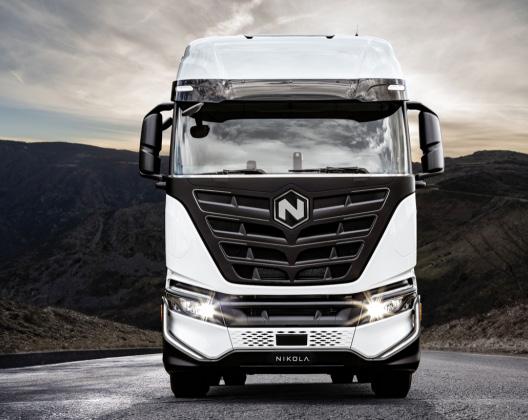
READ MORE
In-truck payment pilot aims to simplify refuelling process
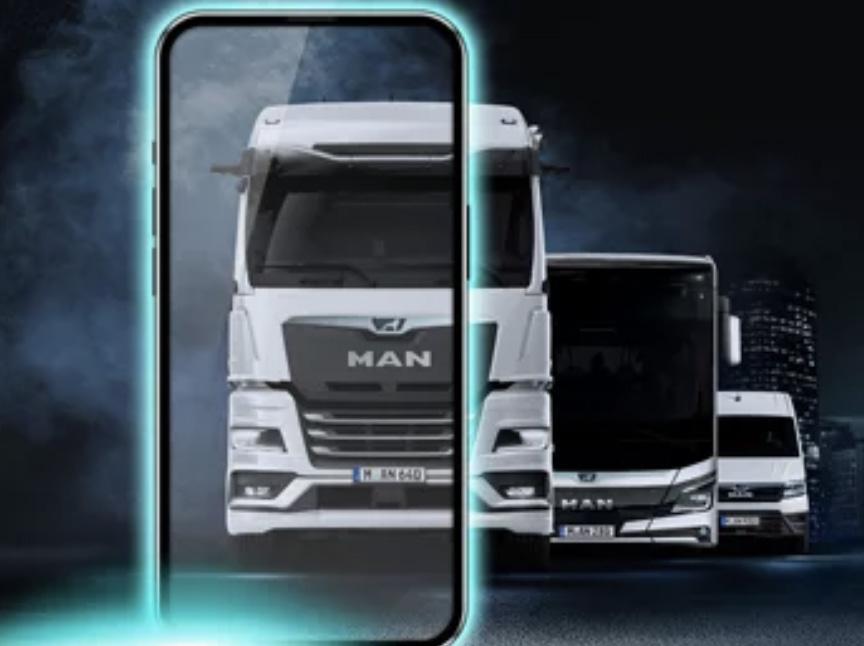
the transaction and pays for the fuel itself. InTruck Connect makes the process efficient and easy, so that drivers and managers can save time and have more security and transparency over their fuel purchases.”
BP InTruck Connect is an appbased solution that makes fuel purchasing and management faster, more efficient and more secure for both truck drivers and fleet managers. The app will integrate into MAN’s existing truck infotainment system. It requires an activated MAN telematics box and an approved BP In-Truck Connect account - there is no need for expensive additional hardware to get started. Available for use at BP forecourts, the app automatically provides accurate information on fuel purchases, mileage and other data to fleet managers, eliminating errors and removing the need for drivers to enter mileage themselves. It also connects fuel cards with truck data, to improve security and help identify potential discrepancies.
The pilot with MAN Truck & Bus is set to launch in Q4 2022 in the UK with plans to extend into Europe in 2023.
READ MORE
FREIGHT
Eurotunnel Le Shuttle Freight has launched a new online emissions calculator to enable logistics companies to calculate their CO2 savings.
With a truck travelling on a Shuttle emitting 12 times less greenhouse gases than travel by ferry, Eurotunnel Le Shuttle Freight is eager to help its clients further reduce environmental impact per load.
Once determined, each company will be able to publish their results on a tailored certificate which will declare how many tonnes of CO2 customers emit and, most importantly, save by using its services and benefitting from the short strait crossing, across a set time period of up to a year. One benefit is that companies can flexibly calculate their CO2 usage for specific loads via an online calculator, allowing them to demonstrate their commitment when tendering for new business or renewing contracts. Eurotunnel Le Shuttle Freight prides itself on its sustainability ambitions with an ultimate target of achieving carbon neutrality by 2050 and already succeeding in reducing emissions by 33% between 2012 and 2019. To support this, Eurotunnel Le Shuttle Freight has already introduced fully electric trains with 100% low carbon electricity in both the UK and France.
Christian Dufermont, Freight commercial director at Eurotunnel Le Shuttle Freight said: “As a vital transport link between the UK and Continental Europe, we recognise the importance of helping our customers become as sustainable as possible. With the increasing pressure on the logistics industry to reduce their CO2 output, we are hoping our emissions certificate will enable freighters to better monitor their environmental impact and to help reduce it even further by using more sustainable means of crossing the Channel.”
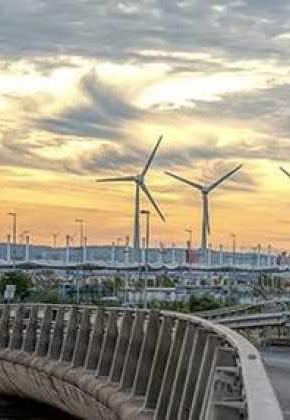
READ MORE


CNG Fuels has opened its tenth low-carbon HGV refuelling station in Castleford, as demand for the fuel increases, with the number of bio-CNG powered trucks on the road doubling in the last year alone.
The new station means that CNG Fuels can now refuel 5,000 HGVs across the UK daily, saving up to 1,600 tonnes of CO2 every day, or 584,000 tonnes of CO2 annually when compared to diesel – equivalent to powering over 113,000 homes for an entire year.
Renewable biomethane – derived from food waste and manure by CNG Fuels – is the lowest carbon, most costeffective alternative fuel to diesel available to HGVs today, cutting emissions by over 90 per cent whilst providing up to a 40% lifetime fuel cost saving.
The new station in Castleford is the company’s 10th operational site, extending the range of low-carbon deliveries into North East England. The site can refuel up to 500 HGVs per day, cutting 67,500 tonnes of greenhouse gas emissions annually when fully utilised – equivalent to the annual emissions of over 40,000 cars. Most of the UK is already within a 300-mile round trip of a CNG Fuels renewable biomethane refuelling station and the site will put Leeds, Hull, and Wakefield within its range, serving local and passing fleets using the M1, A1 and M18.
Located in the Normanton Industrial Estate, CNG Fuels’ newest station will give multiple existing CNG Fuels customers, including major household brands and new local fleet operators, access to low carbon biomethane.
Aldi is the UK’s fifth-largest supermarket, is the latest major brand to adopt bio-CNG HGVs and is among many other household brands, including Royal Mail, Waitrose, and Warburtons to use CNG Fuels’ newest site.
Demand for the fuel from fleet operators is growing at around 100 per cent per annum, and CNG Fuels forecasts the demand to continue to accelerate, with around 10 per cent of the UK’s high-mileage HGV fleet expected to run on Bio-CNG by 2025. CNG Fuels has seen rapid growth in demand since the start of 2022 as the benefits of Bio-CNG begins to reach the mass market. Orders for 6x2 Iveco trials – one of the latest CNG-ready HGVs to be launched to the market – have reached an all-time high as the market moves away from early adopting large fleets, to fleets of all sizes.
The Castleford station joins nine other refuelling stations operated by CNG Fuels across the UK, including the world’s largest public access biomethane refuelling station in Avonmouth near Bristol. The company plans to have 20 large public access stations in operation by the end of 2023, with sites in Newton Aycliffe and Corby entering the construction phase at the end of July 2022.
READ MORE
ELECTRIC TRUCKS
Volta Zero electric truck tested to hot weather extremes
Volta Trucks has completed a rigorous programme of hot weather testing of its fullelectric 16-tonne Volta Zero.
The hot weather testing programme took place over six weeks at the purpose-built Nardo Technical Centre in Southern Italy. It was designed to ensure that the Volta Zero will be reliable and durable when series production of customer specification vehicles starts early next year.
The vehicle development team at Volta Trucks completed more than 2,500km of customer-focused driving cycles at motorway, town and city speeds. Undertaken in temperatures of up to 39 degrees Celsius during the day and 28 degrees Celsius at night, the air conditioning system and thermal management of the battery and powertrain of the Volta Zero have been fully evaluated and pushed to the extremes to ensure optimum operational reliability.
Although unlikely to be experienced in its natural urban surroundings, testing has also been undertaken on course dustier surfaces, which provided an even tougher challenge for the Volta Zero’s chassis, pushing the vehicle’s suspension, steering, traction control and braking system beyond the expected limit of normal customer usage. In addition, dust accumulation was studied for cabin and load box ingress, as well as how it sits on components such as lights, wipers and panels.
Ian Collins, chief product officer of Volta Trucks, said: “The completion of our hot weather testing programme marks another important milestone in the development and delivery of the Volta Zero. The testing allows our engineers to incorporate their latest findings in the series production of customer specification vehicles, ensuring the Volta Zero will deliver a reliable and durable experience for future customers.”
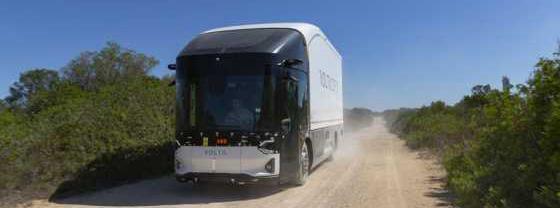
READ MORE
Tesco takes on electric truck to make deliveries to 400 stores
Tesco has taken on a zeroemission electric lorry to make deliveries from its distribution centres to stores in city centres.
The Renault D Wide E-Tech is now delivering to more than 400 stores in Greater London, with further electric lorries entering service in the coming months. The lorry has a range of up to 130 miles and is able to carry the same payload as the diesel truck it replaces.
The lorry is expected to replace around 30,000 miles per year of diesel-fuelled road miles with clean green energy, removing 23 tonnes of CO2e per year. To power it, Tesco has installed electric charge points at its Dagenham distribution centre.
The Renault Trucks D Wide E-Tech vehicle has multi temperature zones - allowing the truck to move stock that has different temperature needs. Tesco is also working with Volta Trucks on a prototype full-electric lorry. The Volta Zero was specifically designed to help tackle the problem of emissions in urban areas as well as improving road safety as a result of its purpose-built, ground-up design. The glasshouse-style cab, where the driver sits in the centre, together with cameras replacing wing mirrors, minimises blind spots and allows the driver better visibility of pedestrians and other vulnerable road users.
Adding electric delivery lorries to its fleet will contribute to Tesco’s efforts to achieve net zero emissions in its own operations by 2035. In January this year, Tesco became the first UK retailer to add electric heavy freight articulated trucks to its fleet, that transport products emissions-free between Cardiff rail terminal and its distribution centre in Magor.
Jason Tarry, Tesco UK and ROI CEO said: “We all want to see improved air quality and less pollution in our towns and cities, and electric vehicles will play a crucial role in achieving this. The Tesco distribution network is one of the largest in the UK and provides us with a great opportunity to roll out new technologies like this industryleading E Tech electric truck from Renault Trucks. Together with our switch to electric home delivery vans and rolling out electric vehicle charging points for our customers, we’re really excited about the improvements we’re making across our business, and our transition to electric vehicles.”
Carlos Rodrigues, managing director, Renault Trucks UK & Ireland, said: “We are delighted that Tesco, the UK’s largest supermarket chain, has chosen to partner with Renault Trucks on its journey to net zero and selected the E-Tech D-Wide for its first fully electric model to move refrigerated goods more quietly and with zero emissions across the Greater London area.”

READ MORE
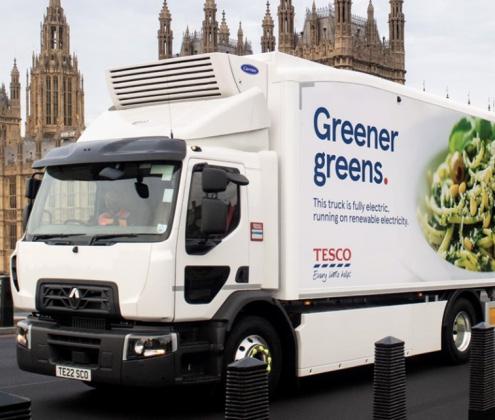
Nissan announces pricing for new Townstar electric van
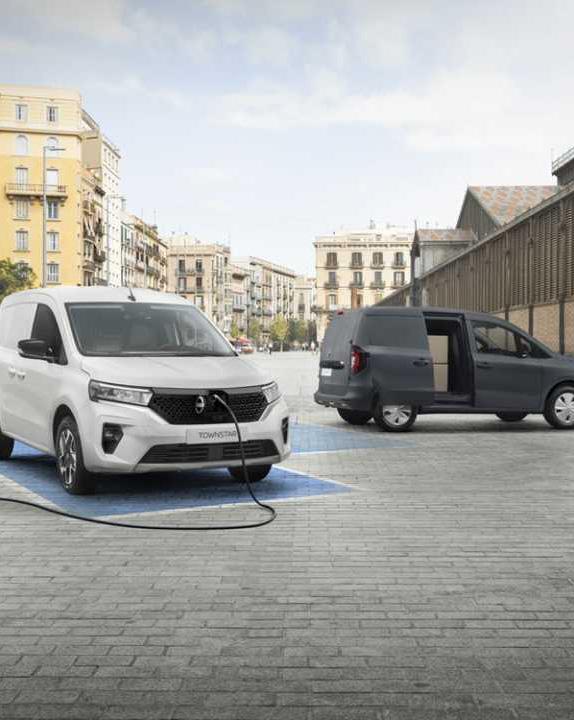
Nissan has revealed the pricing structure for its new compact van, Townstar, which comes with an electric or petrol powertrain
For the electric variant, prices will start from £29,945 for a short-wheelbase Townstar equipped with a 45kWh battery, with a range of up to 183 miles WLTP combined or up to 269 miles in city cycle.
Alternatively, a 1.3-litre TCe petrol unit is also available and is fully compliant with the latest Euro 6d-Full emissions regulations, delivering 130HP of power and 240Nm of torque, offering power and efficiency in equal measure. Petrol versions of Townstar start from £19,475.
When it comes to carrying capabilities, Townstar provides a generous payload of up to 600kg (SWB) or 800kg (LWB). In addition, the maximum braked towing capacity is 1,500kg.
Electric versions of the allnew Townstar will come with an 11kW (Visia grade) or 22kW AC (Acenta grade on) on-board charging system. As with its e-NV200 predecessor, there will also be a DC rapid charging connector standard from Acenta grade, which can recharge the battery from 0% to 80% in a little over 40 minutes.
Prices for all-electric shortwheelbase examples range upwards to £34,845 for a Tekna+ model. Long-wheelbase all-electric Townstar varies in price from £31,245 (Visia) to £35,845 (Tekna+).
On petrol versions, the aforementioned £19,475 price tag applies to a SWB Visia trim-level vehicle, powered by Nissan’s 1.3-litre TCe petrol engine and with a six-speed manual transmission.
The most expensive shortwheelbase petrol-powered Townstar, in top-of-therange Tekna+ specification, comes in at just £23,125.
Turning to long-wheelbase petrol options, prices range from £20,775 (Visia) to £24,425 (Tekna+).
The official start of sales will be 1 October for the petrol version and 1 December for the EV version.
READ MORE
Harris MAXUS looks to a brighter future as the era of electric vehicles ramps up
The transition to electric vehicles is critical in the fight against climate change. And luckily, it’s clear to anyone driving on UK roads, that the transition to EV is already well underway. But, even so, a lot more needs to be done if the UK is to reach its emission targets in the years ahead and collaboration between the public and private sectors is key to that success. Here, Mark Barrett of Harris MAXUS addresses the perceived barriers to EV adoption
One company that is firmly focused on this transition to greener motoring and is leading the charge for electric driving in the UK is commercial vehicle brand MAXUS. Mark Barrett, general manager of Harris MAXUS believes that easing range anxiety and helping businesses and drivers understand the advantages of electric can help accelerate the shift to EV.
Range
“One of the biggest challenges in the transition to electric motoring is range anxiety. Many people and businesses still feel uncomfortable getting a fully electric vehicle because they’re worried about battery range, finding charging stations and the time it takes to recharge,” said Mark.
“While these worries are valid, we have come a long way in terms of the technology and infrastructure available to EV drivers over the past 10 years – these things are continually growing and evolving to meet the needs of EV drivers. Right now, there are more than 33,200 charging points across the UK – this is a significant number, which will continue to grow in the years ahead as the UK accelerates its plans to transition all vehicles to zero emission by 2040,” Mark added.
Pricing
But it’s not just range and access to chargers that deter buyers from an EV; pricing is also a key issue. The cost of purchasing an EV vehicle can seem more expensive than your regular petrol or diesel version, but Mark Barrett argues that the overall cost of ownership must be considered, as this is the true cost of ownership that includes running costs: “Typically, buying an EV outright can cost more than an ICE (Internal combustion engine), but EV owners save money in the long run when energy costs and maintenance costs are factored in.
“On top of this, EVs hold their value better than combustion engine equivalents so when it comes to trading in for a newer model, buyers have more bargaining power. This is often overlooked, but it is a huge financial benefit to owning an EV.”
Guidance
Another factor that can prevent buyers from moving to electric is simply not knowing where to begin when it comes to purchasing their EV. There can be a lot of elements to factor in, and a lot of research is needed to figure out exactly what your needs will be. While purchasing one electric vehicle can be a head-spinner, it can be even more challenging if it’s a fleet of EVs that need to be purchased. The highly experienced teams at MAXUS are aware that navigating the switch to electric can be difficult and it is for this reason that MAXUS has set up a business advice service for those looking to invest in EVs.
“We are with our customers every step of the way on their EV journey. Our dealerships provide business owners and fleet managers with a realistic evaluation of where they are on their journey to greener motoring and what they need to do next. Some may be ready to make the switch, others may need to put policies and infrastructure in place before making the move and MAXUS provides a step-by-step guide to ensure that move is as seamless as possible and if they’re not ready, we will let them know” says Mark Barrett.
Incentives
Incentives are an important element in the UK’s plans to drive the transition to electric. Currently in the UK there is a government subsidy in place for eLCVs where buyers can access a grant of £2,500 (small van) or £5,000 (large van). But Mark Barrett strongly believes that combining efforts between public and private sectors can have an even bigger impact on the transition to electric motoring. “As a leading stakeholder, MAXUS is committed to playing its part in the drive the transition to EV too. That is why earlier this year MAXUS launched a multi-million EV Support Programme to encourage and support van drivers and fleet buyers in the UK to switch to electric motoring.
“The EV Support Programme saw MAXUS invest £30 million into the UK EV market to help van drivers, small businesses and larger fleets move away from Internal Combustions Engines (ICE) for good. To incentivise the switch to electric, 2000 MAXUS e DELIVER 9 vans have been subsidised, meaning that van drivers can pick up a brand-new MAXUS e DELIVER 9, which usually retails for £68,000, for as little as £48,000 (including the government grant of £5,000).” L
FURTHER INFORMATION





